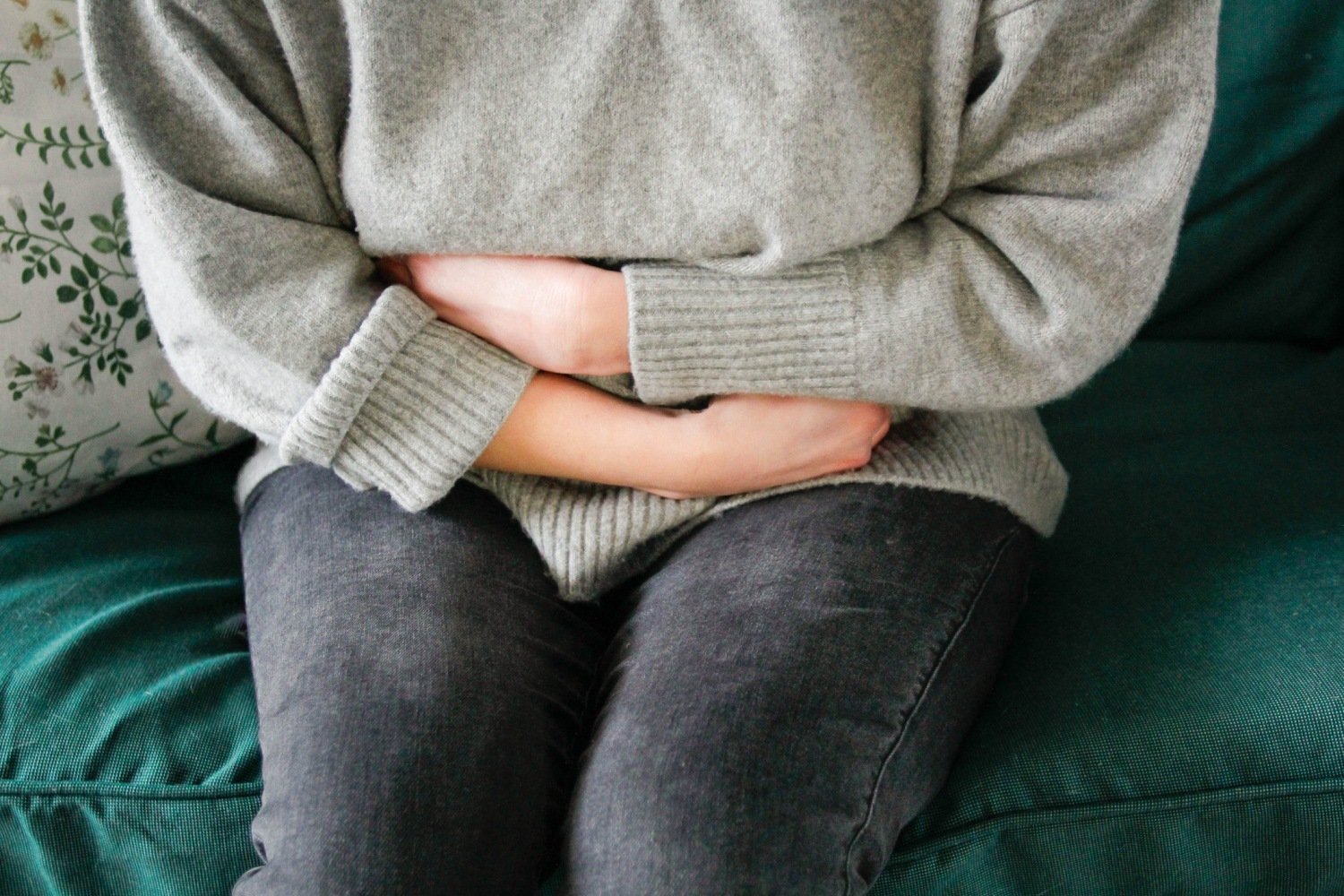9 signs of polycystic ovary syndrome (and how to find relief)
Learn what polycystic ovary syndrome (PCOS) means, 9 of the first signs of polycystic ovary syndrome in the body, plus ways to alleviate it mindfully.
Navigating unexpected health symptoms can feel overwhelming, especially when those symptoms don't seem to make sense. Polycystic ovary syndrome (PCOS) is a condition that many women face, yet often struggle to recognize due to its varied symptoms. Whether you're concerned about your own health or supporting someone else, gaining insight into this condition and learning tools to alleviate the symptoms can go a long way towards improving wellbeing.
What is polycystic ovary syndrome (PCOS)?
Polycystic ovary syndrome is a condition that many women experience, yet is often difficult to diagnose. PCOS is a hormonal disorder affecting women of reproductive age, and women with PCOS may have infrequent or prolonged menstrual periods or an excess of male hormone (androgen) levels.
One of the hallmarks of PCOS is the development of cysts, which are small, fluid-filled sacs in or on the ovaries. Despite the name, not every woman with PCOS will have these cysts—it's the hormonal imbalance that's most indicative of the condition. This imbalance can prevent the ovaries from releasing eggs regularly or even at all, which is why PCOS is one of the leading causes of infertility in women. In addition to reproductive issues, PCOS can also lead to other health challenges like insulin resistance, which is linked to diabetes, and metabolic syndrome, increasing the risk of heart disease and other health issues.
PCOS isn’t just about physical health, however. The emotional and mental impact of dealing with symptoms like weight gain, acne, and hair growth in unwanted places can significantly impact a person’s confidence and overall wellbeing.
Possible causes of polycystic ovary syndrome
While the exact cause of PCOS remains unknown, researchers have identified several factors that are commonly associated with the development of this condition. These factors provide valuable insights, helping us to better understand and manage PCOS. However, it’s important to remember that this condition is complex, and its causes can vary from person to person. Having one or more of these factors does not guarantee that someone will develop PCOS, nor does the absence of these factors mean that PCOS is not a possibility.
Excess androgen
Androgens are often referred to as "male hormones," but they are present in both men and women. Women with PCOS tend to have higher levels of androgens. This excess can disrupt the menstrual cycle—leading to irregular periods—and can also cause hirsutism (excess body hair) and acne.
Heredity
Research suggests that PCOS may be hereditary, meaning it can run in families. If your mother, sister, or aunt has PCOS, your own risk of developing the condition may be higher. This genetic link is a key area of ongoing research in the study of PCOS.
Low-grade inflammation
Inflammation is the body's way of fighting off injury or infection, but in some cases, this response can be chronic or low-grade. Women with PCOS often have low-grade inflammation, which can stimulate the ovaries to produce more androgens. This inflammation is also linked to insulin resistance, another factor associated with PCOS.
Insulin resistance
Insulin is a hormone that helps the body use sugar from foods for energy. When cells in the body don’t respond normally to insulin (a condition known as insulin resistance), the body's demand for insulin increases. High insulin levels can lead to increased androgen production, contributing to the symptoms of PCOS. Additionally, insulin resistance is closely linked to obesity, which can exacerbate PCOS symptoms.
If you suspect you have PCOS or recognize any of its signs, it's essential to consult a healthcare professional. Early diagnosis and a tailored management plan can make a significant difference in your health and well-being.
What are the first signs of PCOS?
It's important to remember that having one or more of these symptoms doesn’t necessarily mean you have PCOS. However, if you’re experiencing a combination of these signs, it’s advisable to consult with a healthcare professional. Bear in mind that you may only have a few of these symptoms. Each person’s experience of PCOS is unique.
1. Irregular or absent periods
One of the most common signs of PCOS is a change in your menstrual cycle. You might find that your periods are irregular, or they might stop altogether. This irregularity is due to the hormonal imbalances associated with PCOS, which can disrupt the normal menstrual cycle.
2. Enlarged ovaries with cysts
While not present in all cases, many women with PCOS have enlarged ovaries that contain numerous small cysts. These cysts are follicles containing eggs that have not matured properly due to hormonal imbalance.
3. Excess body hair
This condition, known as hirsutism, involves the growth of hair on the face, chest, and back. It's a result of the increased androgen levels in the body, a male hormone that women usually have in smaller amounts.
4. Abdominal weight gain
Gaining weight, especially around the abdomen, is another common sign of PCOS. This weight gain can be challenging to manage and can lead to further health complications if not addressed.
5. Acne
Hormonal imbalances can also lead to persistent acne, which might not respond to typical acne treatments. This acne can be more severe than usual and can continue well into adulthood.
6. Male-pattern baldness
Some women with PCOS experience thinning hair or hair loss from the scalp in a pattern similar to that associated with male-pattern baldness. This can be particularly distressing as it affects appearance and self-esteem.
7. Infertility
Difficulty in getting pregnant can be a significant sign of PCOS. The hormonal imbalance can interfere with the development and release of eggs from the ovaries, making conception difficult.
8. Skin tags
These small flaps of excess skin can appear in various areas of the body and are more common in women with PCOS.
9. Dark, thick patches on skin
Often found in the neck, armpits, and under the breasts, these patches are a condition known as acanthosis nigricans and are associated with insulin resistance, a common issue in PCOS.
How can you alleviate the symptoms of PCOS?
Navigating the symptoms of PCOS can be extremely stressful, both physically and mentally, for women. While there is no cure for PCOS, there are various ways that can help alleviate symptoms. However, it’s important to note that the effectiveness of these strategies can vary from person to person. We always recommend consulting with a healthcare professional before making any lifestyle changes.
1. Manage stress
Stress can exacerbate certain symptoms and lead to a dysregulation of hormones. As PCOS is associated with hormonal imbalance and insulin resistance, chronic stress can further disrupt the internal balance of the body. Improving stress management may help reduce hormonal imbalances and may positively impact insulin sensitivity.
💙 Explore how to manage stress with our 7 Days of Managing Stress series led by Tamara Levitt, Head of Mindfulness at Calm.
2. Eat nutritious foods
Adopting an anti-inflammatory diet may help alleviate symptoms. PCOS is associated with chronic low-grade inflammation, and certain dietary choices can contribute to or reduce the inflammatory response of the body. Eating whole, unprocessed foods rich in antioxidants and anti-inflammatory compounds, such as omega-3 fatty acids, and reducing added sugars may help symptoms. Staying hydrated by drinking plenty of water throughout the day is also recommended, as water is essential for overall health.
💙 Adopting a new way of eating when everything in your life already seems to be overwhelming can be challenging. Start slow by bringing awareness to your eating habits with the Benefits of Mindful Eating session.
3. Move your body mindfully
Physical activity, even moving mindfully and going on short, leisurely walks, is known to reduce stress. Exercise can contribute to more balanced hormones and also enhance insulin sensitivity, which can help relieve painful periods and insulin resistance, common symptoms caused by PCOS.
💙 It’s important to tune in to what your body needs and find ways to incorporate gentle, Mindful Movement into your life. From light stretches in the morning to Moving for Fun in the afternoon and evening, lean into what feels good for you.
4. Prioritize adequate rest
Not sleeping well can contribute to elevated stress levels, which is known to enhance PCOS symptoms. Sleep also plays a crucial role in regulating hormones. Adequate sleep helps maintain a balanced production of hormones and supports insulin sensitivity, helping regulate blood sugar levels. Quality sleep also helps mental health and emotional well-being. Establishing a sleep routine, creating a comfortable sleep environment, limiting stimulants (like caffeine and nicotine) as well as alcohol), and practicing relaxation techniques before bed are all ways to help improve your quality of sleep.
💙 Progressive muscle relaxation is a practice that can help you release tension before bed. Try Soften Into Sleep to help you unwind tonight.
Signs of polycystic ovary syndrome FAQs
Q: At what age does PCOS typically occur?
Polycystic ovary syndrome (PCOS) can begin soon after a woman starts her period, typically around puberty. Most women are diagnosed in their 20s or 30s, but PCOS can affect adolescent girls, as well as women in their reproductive years. It's important to note that the symptoms of PCOS—like irregular periods or acne—are common in teenage girls, making early diagnosis complex. If these symptoms persist or are accompanied by other signs of PCOS, like excessive hair growth or significant weight gain, it's a good idea to seek medical advice.
Q: Can PCOS cause infertility, and how is it addressed?
Yes, PCOS is one of the most common causes of infertility in women, primarily because it can affect ovulation. However, it's important to remember that having PCOS doesn't mean you can't get pregnant. Many women with PCOS conceive naturally, while others may need medical assistance. Treatments for infertility related to PCOS include lifestyle changes like diet and exercise, medications to stimulate ovulation, and in some cases, assisted reproductive technologies like in vitro fertilization (IVF). It's crucial to work with a healthcare provider to find the best treatment approach for your individual situation.
Q: Are there lifestyle changes that can alleviate PCOS symptoms?
Absolutely! Lifestyle changes are often the first line of defense in managing PCOS. This includes maintaining a healthy weight through a balanced diet and regular exercise, which can help regulate your menstrual cycle and reduce insulin resistance. Even modest weight loss can improve symptoms and overall health in women with PCOS. Stress management is also important, as stress can exacerbate PCOS symptoms. Simple activities like walking, yoga, and mindfulness exercises can be beneficial.
Q: Is PCOS a hereditary condition?
While the exact cause of PCOS is unknown, studies suggest a strong genetic component. This means if a close biological family member—like your mother or sister—has PCOS, your risk of developing the condition may be higher. However, environmental factors and lifestyle choices are also believed to play a significant role in the development of PCOS. Understanding your family health history can be a helpful piece of information when discussing your health with a doctor.
Q: Can PCOS be managed without medication?
Yes, many women manage their PCOS symptoms effectively without medication. Lifestyle modifications—such as a healthy diet, regular physical activity, and managing stress—can significantly reduce the impact of PCOS. In some cases, however, medication may be needed to address specific symptoms like menstrual irregularity, fertility issues, or insulin resistance. The key is to work closely with a healthcare provider to create a management plan tailored to your individual needs.
Calm your mind. Change your life.
Mental health is hard. Getting support doesn't have to be. The Calm app puts the tools to feel better in your back pocket, with personalized content to manage stress and anxiety, get better sleep, and feel more present in your life.














